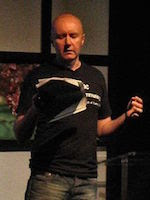“I
write to understand as much as to be understood.”
– Elie Wiesel
Born
on this day in 1928, Wiesel was not only a Nobel Peace Prize Laureate but also the
author of 57 books, written mostly in French and English. His powerful and wrenching book Night
was based on his experiences as a prisoner in the infamous Nazi death camps of
Auschwitz and Buchenwald. He died this
past July at age 87.
at Boston University, which created the Elie Wiesel Center for
Jewish Studies in his honor. He was involved with Jewish causes, and helped
establish the United States Holocaust Memorial Museum in Washington, D.C. The
Norwegian Nobel Committee described Wiesel as "one of the most important
spiritual leaders and guides in an age when violence, repression and racism
continue to characterize the world."
Known as a writer with an uncanny
knack of involving the reader almost from the outset of each of his books, he
noted, “There is a difference between a book of two hundred pages from the very
beginning, and a book of two hundred pages which is the result of an original
eight hundred pages. The six hundred are there. Only you don't see them.” In other words, you just “know” from where
you start reading what has already transpired because of the effectiveness of
what he has written.
Wiesel won a remarkable 30
international awards and honors, including the U.S. Presidential Medal of
Freedom and the John Jay Medal for Justice.
His memoirs are terrific examples for those seeking to write these types
of works. His advice: “With memoir, you must be honest. You must be
truthful. Not to transmit an experience
is to betray it.”
Share A Writer’s
Moment with a friend by clicking the g+1 button below.












